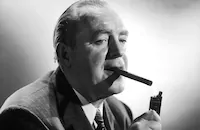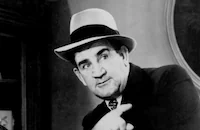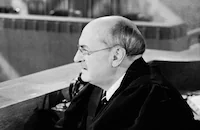Flowing Gold

Brief Synopsis
Cast & Crew
Alfred E. Green
John Garfield
Frances Farmer
Pat O'brien
Raymond Walburn
Cliff Edwards
Film Details
Technical Specs

Synopsis
While drifting through oil fields in search of a job, Johnny Blake, a fugitive from the law who has killed an oil company stooge in self-defense, saves the life of foreman Hap O'Connor when Collins, a drunken bully, tries to kill him. Hap recognizes Johnny as a wanted man and advises him to go back and face trial, but Johnny flees when the police come looking for him. Soon after, Hap quits his job and forms a partnership to drill for oil with Ellery Q. Wildcat Chalmers and his daughter Linda. Johnny comes to the fields to work for Chalmers' competitor, Charles Hammond, thus putting him at odds with Linda, who hates Hammond. However, when Johnny learns that Hap is Chalmers' partner, he quits his job to join Hap. After he is arrested in a barroom brawl, Johnny prepares to flee again while Hap fights a take-over by Hammond, working day and night to bring in the well before the option expires. All seems lost when Hap's leg is broken by a falling pipe until Linda persuades Johnny to stay and take Hap's place. As they toil in the fields together, Johnny also takes Hap's place in Linda's heart. On the day that the option expires, the well comes in and Hap returns from the hospital. When Johnny tells him that he and Linda are planning to be married, Hap insists that Johnny clear his name first and is on the verge of turning him in to the sheriff when lightning strikes the well and it bursts into flames. During the confusion, Hap allows Johnny to escape, but Johnny risks his life and sacrifices his freedom to return with the fire trucks and extinguish the fire. Arrested by the sheriff, Johnny returns East with Linda to face charges with every hope that he will be exonerated.

Director
Alfred E. Green
Cast

John Garfield

Frances Farmer

Pat O'brien

Raymond Walburn

Cliff Edwards

Tom Kennedy

Granville Bates
Jody Gilbert
Edward Pawley
Frank Mayo
William Marshall
Sol Gorss
Virginia Sale

John Alexander

Eily Malyon

E. E. Clive
Crew
Adolph Deutsch
Leo F. Forbstein
Bryan Foy
Kenneth Gamet
James Gibbon
Byron Haskin
Jesse Hibbs
Sid Hickox
William Jacobs
Stanley Jones
Robert E. Kent
Hugh Macmullen
Tom Reed
Hugh Reticker
Jack Saper
Howard Shoup
Willard Van Enger
Jack L. Warner
Perc Westmore

Film Details
Technical Specs

Articles
Flowing Gold
By Richard Harland Smith

Flowing Gold
Quotes
Trivia
Notes
In 1924, Joseph De Grasse directed Anna Q. Nilsson and Milton Sills in another First National version of the Rex Beach novel produced under the same title (see AFI Catalog of Feature Films, 1921-30; F2.1830).















